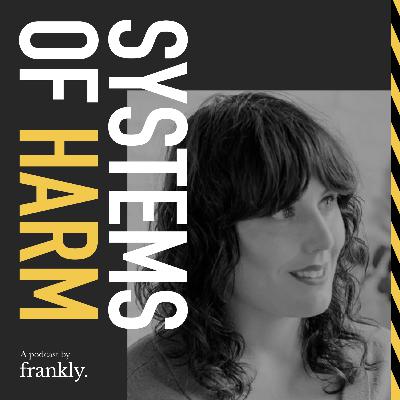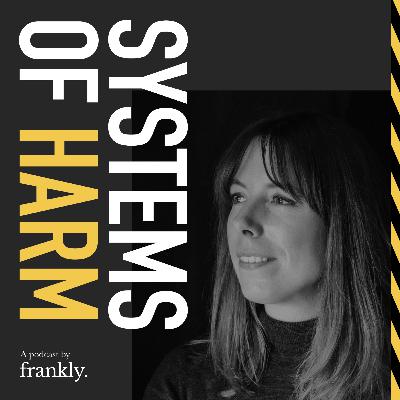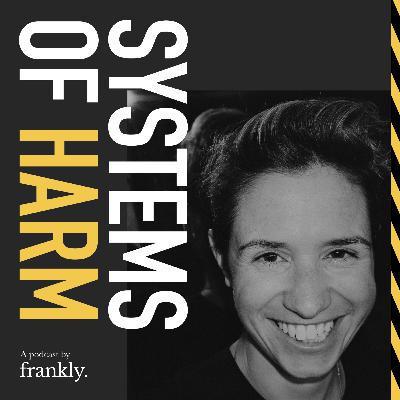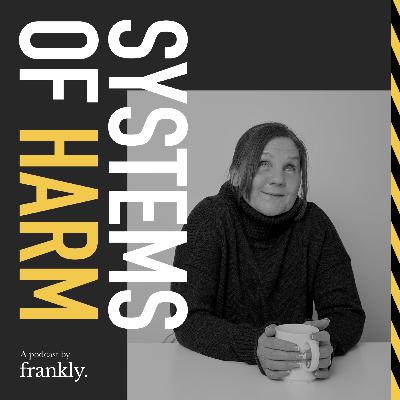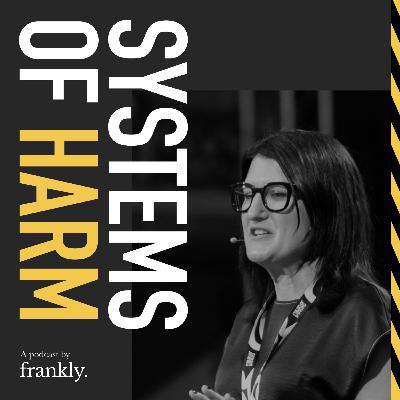Discover Systems of Harm
Systems of Harm

 Systems of Harm
Systems of Harm
Author: Amy Hupe
Subscribed: 13Played: 82Subscribe
Share
© 2025 Systems of Harm
Description
Design systems are the systems of tools, processes and practices that we use to create digital products, like websites and applications. But can design systems play a role in perpetuating systemic harm? Can they do anything to mitigate it?
In this series, design systems consultant and podcast host Amy Hupe interviews guests about their experiences of design systems, systemic exclusion, and how we can work to design more inclusive experiences.
In this series, design systems consultant and podcast host Amy Hupe interviews guests about their experiences of design systems, systemic exclusion, and how we can work to design more inclusive experiences.
12 Episodes
Reverse
To round off the series, I’m speaking to coach, speaker and author of Technically Wrong and Design for Real Life, Sara Wachter-Boettcher. Sara and I talk about why those of us working on design systems are so vulnerable to burnout and what we can do to prevent it. We talk about the importance of living your values, advocating for what’s right, and - crucially - knowing when to quit.
Episode links
https://www.activevoicehq.com/
Sara on LinkedIn: https://www.linkedin.com/in/saraboettcher/
Design for Real Life: https://abookapart.com/products/design-for-real-life.html
Technically Wrong: https://bookshop.org/p/books/technically-wrong-sexist-apps-biased-algorithms-and-other-threats-of-toxic-tech-sara-wachter-boettcher/11186625?ean=9780393356045&next=t&source=IndieBound&ref=https%3A%2F%2Fwww.sarawb.com%2F
Content Everywhere: https://rosenfeldmedia.com/books/content-everywhere/
Is ADHD a barrier to working on design systems, or is it actually a superpower? In this episode, I talk to Brad Frost, creator, web designer, teacher, speaker and writer about his recent experience of being diagnosed with ADHD, and what the past few years have taught him about resilience and self-compassion.
Episode links
https://bradfrost.com/
Brad’s blog post on ADHD: https://bradfrost.com/blog/post/adhd/
Brad on Bluesky: https://bsky.app/profile/bradfrost.com
Brad on LinkedIn: https://www.linkedin.com/in/bradfrost/
Design tokens course: https://designtokenscourse.com/
Atomic design certification course: https://atomicdesigncourse.com/
Brad’s newsletter: bradfrost.com/newsletter/
Wake up excited podcast: https://wakeupexcited.show/
What role do design systems play in supporting people navigating big life events and transitions? In this special episode, I move into the guest seat to discuss a recent life change I’ve been through, with help from special guest host and friend of the pod, Luke Murphy.
amyhupe.co.uk
Amy on Bluesky: https://bsky.app/profile/amyhupe.bsky.social
How do design systems fit into wider social and political systems when it comes to gender, and the inclusion (or exclusion) of trans people? How do they perpetuate exclusion, and what can those of us working on design systems do to mitigate it?
I talk to Lou Downe, author of the best-selling book, Good Services, about their experience of trans-exclusion, and using service and systems design to advocate for equity.
Episode links
https://good.services/
Lou on LinkedIn: https://www.linkedin.com/in/lou-downe-757a83b/
How can design systems help us to create more accessible user experiences? How can we win hearts and minds in the fight to create more equitable experiences for disabled people? Will AI help or hinder us in the process? In this episode I talk to accessibility specialist Léonie Watson, Founder and Director of Tetralogical, Chair of the W3C Board of Directors, and co-Chair of the W3C Web Applications Working Group.
Léonie shares her experience as a blind person, including how technology has created both barriers and opportunities.
Episode links
https://tink.uk/
Tetralogical blog: http://tetralogical.com/blog
Léonie’s LinkedIn: https://www.linkedin.com/in/lwatson/
Léonie on Bluesky: https://bsky.app/profile/tink.uk
What does effective activism look like when it comes to design systems and inclusion? Why are so many of us missing the mark when making the case for prioritising accessibility, and what can we do about it? I talk to Geri Reid, accessibility specialist, to get her tricks of the trade.
Episode links
https://gerireid.com/
Geri’s Linkedin: https://www.linkedin.com/in/gerireid/
Geri on Bluesky: https://bsky.app/profile/gerireid.com
To round off the series, I’m speaking to Sheryl Cababa, Chief Design Officer at Substantial, lecturer, and author of her, Closing the Loop: Systems thinking for designers.
In the episode, Sheryl and I talk about how our design work fits into the wider societal, economic and political systems around us and she shares tools and frameworks for making the invisible, visible.
Episode Links
Sheryl’s blog on Medium (https://medium.com/@SherylCababa)
Sheryl’s LinkedIn (https://www.linkedin.com/in/sherylcababa/)
Closing the Loop: Systems Thinking for Designers, by Sheryl Cababa (https://rosenfeldmedia.com/books/systems-thinking-for-designers/) (Listeners of Systems of Harm can get 15% off the purchase price with the code: cababa-soh)
Imran Afzal is a Principal Designer working on the design systems team at Co-op digital. He’s written and spoken prolifically about his work on design systems, and his own experiences of racism and discrimination.
In today’s episode, we explore the ways in which design systems can perpetuate or mitigate racism in our digital products and practices.
Episode Links
https://www.imranafzal.com/ (https://www.imranafzal.com/)
Imran's Twitter (https://twitter.com/avimran)
Imran’s blog on racism (https://www.ithoughtaboutthatalot.com/2022/when-my-son-asked-if-we-belong-here)
UX London (https://ti.to/clearleft/ux-london-2023)
How can design systems help us to create more accessible digital products and services, and what are the limits to that? In this episode I talk to design systems manager, accessibility advocate, and good friend of mine, Fred Warburton.
Fred shares his experience with sight loss, and how that motivated him to learn about digital accessibility, and create meaningful change.
Episode Links
Fred’s Twitter (https://twitter.com/FredWabz)
Dyscalculia is a learning difference characterised by a persistent difficulty in understanding numbers. In this episode, Laura and I discuss her experiences with dyscalculia, and how design systems can help to create more inclusive digital products for people like her.
Episode Links
Laura’s blog (https://uxwriting.co.uk)
Laura’s Twitter (https://twitter.com/LauraParkerUX)
Accessible numbers project (https://accessiblenumbers.com/)
Dyscalculia poster (https://accessibility-manual.dwp.gov.uk/tools-and-resources/accessibility-posters)
Dyscalculia network (https://www.dyscalculianetwork.com)
Plain Numbers report (https://plainnumbers.org.uk/why-we-exist)
How do design systems contribute to trans-exclusion in our digital, social and political systems? What can we do to create more trans-exclusive experiences? In this episode, I talk to Luke Murphy, a design advocate and a good friend of mine who identifies as non-binary, to explore this issue.
Episode links
https://www.lurkmoophy.com/ (https://www.lurkmoophy.com/)
Luke’s Twitter (https://twitter.com/lurkmoophy)
Zeroheight blog (https://zeroheight.com/blog/)
How does cognitive bias affect the way we design and make digital products, and the way people experience them? To kick off the series, I’m talking to author, speaker and filmmaker David Dylan Thomas, to explore these questions.
Episode links
https://daviddylanthomas.com/ (https://daviddylanthomas.com/)
David’s Twitter (https://twitter.com/movie_pundit)
UX London (https://ti.to/clearleft/ux-london-2023)
Design for Cognitive Bias, by David Dylan Thomas (https://abookapart.com/products/design-for-cognitive-bias)
The Cognitive Bias Podcast (https://podcasts.apple.com/gb/podcast/the-cognitive-bias-podcast/id1197648130)


